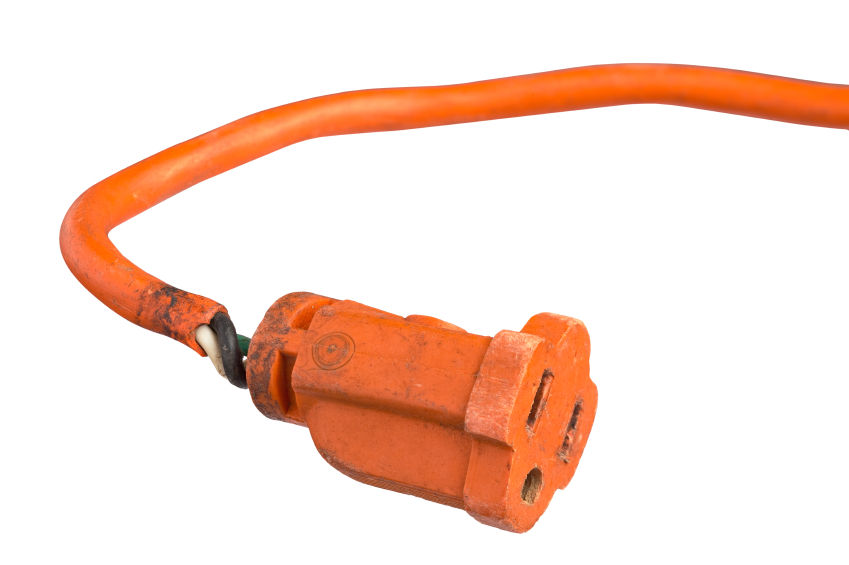Top Causes of Electrical Accidents
 The majority of electrical safety hazards can be prevented. Just use a combination of basic common sense and plain old good wiring.
The majority of electrical safety hazards can be prevented. Just use a combination of basic common sense and plain old good wiring.
For most homeowners, preventing an electrical accident means not plugging too many things into one feeble extension cord (which they do anyway!) or not using a hair dryer while taking a bath (hopefully they do not do this). But while these are valid and important precautions, there are many other potential electrical safety hazards in any home.
Take a look at some of the most common causes of electrical accidents so that you'll appreciate the considerable power (and danger) of electricity and learn to use it safely.
Cords and Plugs
The National Fire Protection Association reports that electrical cords and plugs are responsible for the most civilian deaths related to electrical accidents each year. Yet these are among the easiest hazards to avoid: Never use a cord or plug with evidence of burning, melting or any other visible damage. If the insulation is damaged or missing, or the cord has come loose from the plug, replace the whole thing; never use a cord repaired with electrical tape.
Extension cords (including power strips and surge protectors) are the biggest offenders in the cord category. Do not use extension cords for permanent hookups, conceal them in any way (especially under carpeting), or expose them to water or possible damage.
Always use the right cord for the job, such as 3-prong grounded cords for all appliances and tools that require grounding. Also make sure the cord's capacity well exceeds the demand of what's plugged into it; heavier-gauge cords can handle more current than lighter-gauge cords. Avoid using 3-prong adapters to plug grounded cords into 2-prong outlets (while theoretically possible, the chances of a true ground existing here are extremely slight).
House Wiring/Wiring Systems
Fixed wiring is the second leading cause of electrical-related house fires. Potential problems with household wiring systems can range from overloaded circuits (and improperly rated or installed circuit breakers) ... to damaged wires ... to loose connections on switches, outlets and other devices.
Since most electrical wiring is behind the scenes -- and beyond the realm of common knowledge -- the best way to prevent a wiring-related electrical accident is to have your home inspected by a certified electrical inspector. This pro can look for all of the most common hazards and advise you about correcting problems and how much the solutions might cost.
Fixtures and Appliances
Misuse of lamps and light fixtures is another top cause of electrical accidents. As harmless as it seems, using a 100-watt bulb in a 60-watt fixture (for example) can melt the fixture wires, creating a shock and fire hazard. The same danger exists when plugging a cord into an adapter outlet that screws into a light bulb socket.
As for appliances, don't use any device that sparks, smokes, buzzes, emits a burning smell, or shows any cord damage. Unplug appliances before cleaning them. Never operate an appliance or equipment while standing in water.
Wet Areas
GFCI (ground-fault circuit-interrupter) outlets are required in all bathrooms, kitchens, garages, outdoors, and other potentially wet areas in and around the home. If you don't yet have these in your wet areas, hire a licensed electrician to replace your old outlets as soon as possible. (Don't worry, installation doesn't require rewiring). GFCIs protect against a variety of common electrical accidents, including shock or fire from electrical current reaching water, faulty appliance and tool wiring, and other ground-fault hazards.
With All Due Respect ...
As a general rule, the best approach to preventing electrical accidents is to treat this often underrated power source with respect. This means actually following the advice written in product manuals and on the little labels on cords, appliances, fixtures, and other devices.
It also means purchasing and using only electrical products that are approved by an independent testing group, such as Underwriters Laboratories ("UL") or ETL-SEMCO ("ETL").
Never modify or tamper with electrical equipment, and don't be lazy about repairing or replacing any old, outdated or damaged devices, including all those feeble extension cords you've been using for years. You're pushing your luck with those!
Make sure you have smoke alarms installed to alert you in case of an emergency.
Looking for a Pro? Call us (866) 441-6648

Electrical Average Costs
Electricians Experiences

Circuit Breaker Replacement For A K9 Facility

Whole House Fan Installation Saves Me Money On Electricity



